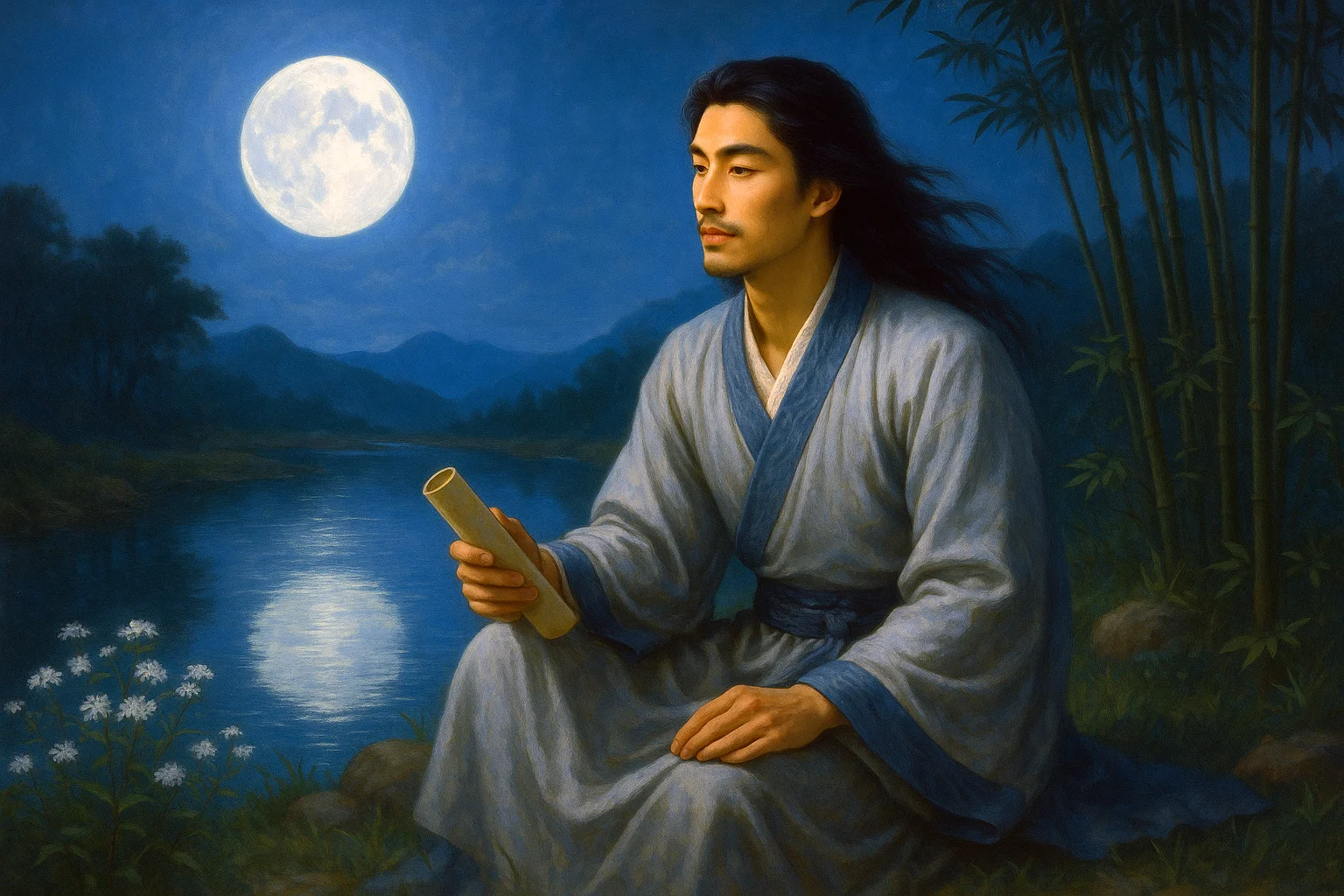The sea's restless lungs spit clouds that flee and swirl,
North wind whips up thunder's blue concussion.
Four sides of vermilion cage unhook their pearl—
I lie watching mountains drink rain's execution.
Original Poem
「西楼」
曾巩
海浪如云去却回,北风吹起数声雷。
朱楼四面钩疏箔,卧看千山急雨来。
Interpretation
Composed during the Xining era of Emperor Shenzong's reign, this work captures Zeng Gong's maritime encounter while navigating the uncertainties of official travel along the southern coast. As one of the Eight Great Prose Masters of Tang-Song dynasties (though less renowned for poetry), Zeng here demonstrates remarkable lyrical precision in this septasyllabic quatrain. The poem transforms an approaching storm into a metaphysical theater, where the poet's composure mirrors the Neo-Confucian ideal of maintaining equilibrium amidst cosmic turbulence.
First Couplet: "海浪如云去却回,北风吹起数声雷。"
Hǎilàng rú yún qù què huí, běifēng chuī qǐ shù shēng léi.
Waves like stormclouds charge, retreat, then rally; / north winds rouse thunder's grumbling volley.
The simile "like stormclouds" (如云) erases horizon distinctions, creating elemental chaos. The verbs "charge-retreat-rally" (去却回) mimic military maneuvers, casting nature as both adversary and ally. "Grumbling volley" (数声雷) anthropomorphizes thunder as celestial artillery, heightening the pre-storm tension.
Second Couplet: "朱楼四面钩疏箔,卧看千山急雨来。"
Zhū lóu sìmiàn gōu shū bó, wò kàn qiān shān jí yǔ lái.
On crimson tower, rolled-up blinds all around; / I recline watching rain lash mountain-ground.
The theatrical "rolled-up blinds" (钩疏箔) transform the tower into a spectator box for nature's drama. "Recline watching" (卧看) embodies the scholar-official's ideal: engaged detachment. The final "lash" (急雨来) delivers the storm's kinetic payoff while confirming the poet's unshaken vantage—a metaphor for intellectual poise amid political tempests.
Holistic Appreciation
The poem opens with vivid natural imagery—from surging ocean waves to approaching thunder—before shifting to a tranquil scene of observing the storm from a high tower. Its rhythm mirrors the undulating forces of nature, seamlessly blending external scenery with inner contemplation. The first two lines establish the momentum of wind and thunder, while the latter two capture the human posture of calmly witnessing the rain, creating a dynamic interplay between movement and stillness, reality and imagination. Far from fearing the storm, the poet welcomes it with open arms, finding exhilaration in watching "a thousand mountains engulfed by torrential rain." This not only paints a majestic natural tableau but also reveals the poet's expansive, unshaken spirit.
Though devoid of explicit emotional expression, the depiction of the storm conveys the poet's composure in chaos and determination to face adversity head-on, rich with symbolic resonance. The poem's vibrant imagery and grand atmosphere use nature as a medium for profound personal reflection, leaving endless interpretive possibilities.
Artistic Merits
- Striking Metaphors, Blending Real and Abstract
The comparison of "ocean waves to clouds" subtly merges sky and sea, while "claps of thunder" intensify the pre-storm tension—vivid metaphors that bring the scene to life. The phrase "reclining to watch" transitions from the physical to the metaphysical, embodying transcendental detachment. - Clever Composition, Rigorous Structure
Centered on the "tower," the poem’s perspective shifts from the sea outside to the observer within, then through the raised bamboo curtain to the rain lashing the mountains. This natural yet layered structure creates a cinematic flow. - Scene and Emotion Intertwined, Meaning Beyond Words
Without directly stating emotions, the poem reveals them through its storm imagery. The poet uses nature’s fury to reflect unflappable resilience, embodying confidence and grace in overcoming trials.
Insights
This poem teaches us to face life’s storms with equanimity and openness. Amid the impending tempest, the poet doesn’t seek shelter but instead "hooks up the curtain" and "reclines to watch the rain," demonstrating a wisdom that embraces challenges while appreciating their grandeur. It reminds us that true strength lies not in avoiding turbulence but in finding awe and steadfastness within it. Life’s storms are inevitable, but cultivating a mindset to "recline and watch the mountains brace the rushing rain" may well be the key to a poised and fearless existence.
About the Poet

Zeng Gong (曾巩, 1019 - 1083), a native of Nanfeng in Jiangxi province, stands among the illustrious "Eight Great Masters of Tang-Song Prose." His writings distinguished themselves through an elegant classical balance, celebrated for their rigorous argumentation and refined literary craftsmanship. While his poetry embraced an artless subtlety, his prose achieved what critics hailed as "the very essence of purity" - an achievement that, though perhaps less dazzling than his contemporaries like Su Shi or Wang Anshi, earned him posthumous reverence as the founding master of the "Nanfeng Literary School."












